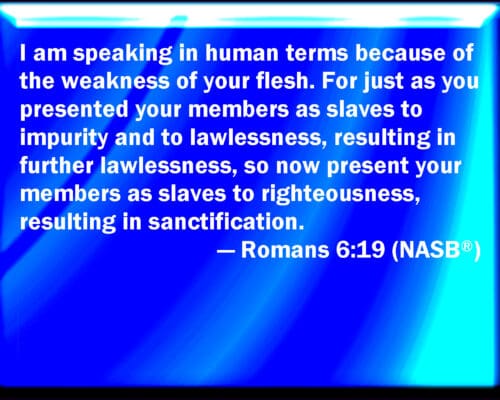Wow! This is Controversial! Where Am I Going to Stand?
The world is full of controversial subjects! Jesus and His followers were nothing if not controversial! If we do our best to follow Him closely, we can expect to be somewhat controversial as well! We need to have a personal plan for dealing with controversy when it arises. Let’s give that some thought.
First let’s consider the really big controversy that most young adults have to come to grips with early in their transition into adulthood: "Is the Bible trustworthy?"
This is an incredibly important issue! A few years ago we started a club in our school to help high school students begin to deal with this controversy. We call it the Veritas Club. I won’t go into details about that here. However, I have started a web page so you can see some of the issues we try to deal with in that club. If you like, you may read some of the handouts we provide on our Veritas page: Veritas Handouts (pdf files).
If we come to the conclusion that the Bible cannot be trusted, then we find ourselves "all over the board" with other controversial issues, with our rationales becoming something along these lines: "Well, it makes (or doesn’t make) sense to me." or "It just feels (or doesn’t feel) right to me in my heart (or in my guts)." or "I have a lot of confidence in (substitute a name or organization) and he/they say this is (or is not) right, so I’m going with them on this."
The point is, such people have no real anchor for deciding what is true. Some of them even deny the very existence of "truth" because their logic convinces them that truth cannot exist. For some of them "truth" becomes "what seems to work" (the pragmatists). And they will, of course, debate about what really works vs. what only seems to work.
If you are having trouble with your confidence in the Bible, there are some excellent materials out there in the subject area we call "Christian Apologetics" that you may want to look into. I’m talking about things by Ravi Zacharias, Lee Strobel, etc. There are even some brief things on our website you may wish to read. (Introduction to Apologetics)
But my real intention here is to cause people who claim to be Bible-believers to do some thinking about how they handle controversial issues.
First let me throw out a few typical controversial issues that Christians might find themselves having to deal with. Of course, the list is endless.
Are believers secure in their salvation? or is it possible to do something that might cause us to lose it?
Did God sovereignly choose before creation who would become believers? Or did He leave that choice open to us?
Does a believer have to be baptized? or can he choose to decline that ordinance?
Does baptism have to be immersion? or would pouring or sprinkling be ok?
Is it appropriate for women to preach or pastor a church? or is that a "man-only" role?
Is "speaking in tongues" a gift that has ended? or is it still a gift given by God to some Christians?
Is it appropriate for babies to be baptized? or should baptism be postponed until one is old enough to consciously commit to Christ?
Should we have to confront church members who are continuing in open flagrant sin or who have embraced serious error? or can we just quietly pray for them and trust the Holy Spirit to bring conviction?
And when we come to eschatology, the controversies seem to never end!
Do unrepentant sinners live forever in hell, suffering endless torment? or are they literally destroyed there?
Do the billions of people who have never heard the gospel all automatically go to hell when they die?
Are Christians who have died actively doing things now in heaven? or does all the action start at the resurrection?
Are Christians who have died watching us? or not?
If they are watching us, is it ok to talk with them? or not?
Is Jesus coming back physically and bodily to earth? or is His return to be considered to be a spiritual return?
If Jesus is coming back physically, will there be a literal great tribulation? Will believers go through part or all of it? or will we be raptured before it begins?
(I can hear you saying, "Enough!" But of course, the list could keep going!)
Now I expect that as you read that list, for most of the questions you may have an answer which you very honestly think is correct.
But here is our problem. There are sincere, intelligent, Bible-believing Christians who very honestly think you are wrong!
So how should we handle this situation?
Many of us conclude, "I’m too busy to think about stuff like that. I’ll just leave it all for the Lord to sort out in the end."
Others conclude, "Well, I have my opinions, but I’m not super confident about them, so I’ll just lay low and try to be as non-controversial as possible. When a controversial issue comes up, I’ll try to avoid getting into it!"
Others take positions strongly, but when pressed for their reasons they say, "Well, (substitute a person or group… like "my daddy" or "my church" or "my pastor" or a well-known Bible teacher or pastor) believes that and I know he’s a good man so I agree with him."
Or they may say, "That’s just the way I was brought up! It’s the way I was taught! So I believe it!"
Or we might say, "Hmmmm. That’s an interesting question, but it’s not really an issue for me right now." And that response may be very legitimate for now.
But, like it or not, from time to time, God has a way of bringing controversial issues into our lives! When He does, we need to have thought through how we might best respond to it. Here are some thoughts that might help.
God, Being God, Could Have Given Us a Book that Left No Room for Controversy!
He could have written His Word in such a way that there would be no room for discussion. He could have written it like a systematic theological textbook, answering all these and other questions quite meticulously and with detail and with no ambiguity.
But He chose not to do that.
Why? There may be several reasons.
For instance, there is an interesting verse in the Book of Acts.
“These were more noble than those in Thessalonica, in that they received the word with all readiness of mind, and searched the scriptures daily, whether those things were so.” (Acts 17:11)
Obviously God did not intend for His Book to be a massive systematic reference book where we go to an index, find the answer, and end the controversy. He gave us His living Word through which He speaks to us. As we read His Word, we have the opportunity to fellowship with God as we learn more and more about Him. When we come across passages that seem to contradict one another, we learn to dig a little deeper, do careful word studies, run related cross references. etc. So, disagreements should drive us deeper into fellowship with God as we search His Word!
Knowing that His children would disagree about some of the things in His Word, God gives us a wonderful opportunity to stay humble and teachable! Instead of having a know-it-all, arrogant attitude, we should learn to be gracious and loving toward those who don’t see things the same way we see them.
Unfortunately, many in the church are afraid to disagree with the majority. They fear being ostracized. They fear rejection. They put their desire to please people above their desire to know or stand on the truth. Maybe, sometimes, God brings controversial issues into our lives so that we can learn what it means to "go against the flow."
Just remember, that throughout history, the majority has often proved to be wrong! For Christians, the issue is really not "Who believes this?" or "How many believe this?" It is "What does the Bible really say about this?"
So How Do We Decide?
So if we have decided to let the Bible really be our guide (and not what someone we love has said), how do we make a decision about controversial issues?
Here’s one idea. If an issue is controversial, that means there should be sincere, Bible-believing, articulate advocates on both sides of the issue. We could read what both sides have to say, meditating carefully on the Biblical evidence they marshal, and prayerfully try to decide which seems to us to be most in line with Scripture.
In these days of Internet access, it isn’t difficult to find advocates for different positions. But be careful! Don’t dismiss one point of view merely because the first advocate you find has a bad attitude or does a lousy job making his case.
You might be surprised how few people take time to do this kind of reading! Our tendency is to first make up our mind about what we believe (based on what others have said!), then we try to find studies that support our preconceived viewpoint (and that seem to dismantle any other viewpoints!) Thus armed, we go forth to make our case! We have not really studied the Bible with a teachable spirit! We have made up our mind based on the group we have been identified with. Then we have merely used the Bible to shore up our already-made-up mind.
The Jews were doing this sort of thing when Jesus came. And time and time again He blew away all their preconceived ideas and interpretations of Scripture.
Here’s a Strategy
Next time a controversial issue comes up, here’s a possible plan of action.
First, ask God in prayer to help you make a truly serious study of the issue. Tell him you wish to be teachable and that if you are wrong you are willing for Him to change your mind. Ask Him to help you not care so much about what other people you know happen to believe about the issue. Ask Him for courage to stand alone if necessary!
Second, try hard to understand why people on both sides believe what they do. Look for articulate spokespersons and give some time to studying their reasons.
Third, (Warning! This takes time!) learn how to do careful word studies and cross reference studies on your own. There are some excellent Bible study programs out there. I use The Online Bible. It’s not really on the internet, but a free downloadable Bible study program. I have written a couple of posts about the Online Bible here. Vickie likes E-Sword (free and downloadable). If you prefer a truly online Bible study program, you might try the Blue Letter Bible. It will take you some time to learn to use these proficiently. But we are talking about God’s Word here! Are we serious about it or not?
Fourth, be willing to "wait on God" for awhile. Sometimes it takes time to digest what we are studying. There’s nothing wrong with saying, "I’ve not made up my mind yet where I stand on this issue."
Fifth, be very gracious, kind, loving, and humble in your attitude toward those who may not be able to agree with you! Be willing to listen! Perhaps you have had the experience of being told politely (or not so politely!) to "shut up!" We may have been tempted to communicate that attitude toward others ourselves! In those cases, you won’t find much spiritual growth going on!
Stay teachable! Don’t be afraid to stand alone! Don’t let the majority intimidate you! Keep a gracious and humble spirit! Stay in the Word!
And… Stay in the Battle!







-
Tagged Romans